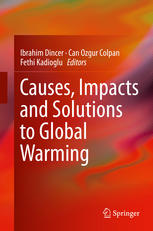

Most ebook files are in PDF format, so you can easily read them using various software such as Foxit Reader or directly on the Google Chrome browser.
Some ebook files are released by publishers in other formats such as .awz, .mobi, .epub, .fb2, etc. You may need to install specific software to read these formats on mobile/PC, such as Calibre.
Please read the tutorial at this link: https://ebookbell.com/faq
We offer FREE conversion to the popular formats you request; however, this may take some time. Therefore, right after payment, please email us, and we will try to provide the service as quickly as possible.
For some exceptional file formats or broken links (if any), please refrain from opening any disputes. Instead, email us first, and we will try to assist within a maximum of 6 hours.
EbookBell Team

0.0
0 reviewsGlobal Warming: Causes, Impacts and Solutions covers all aspects of global warming including its causes, impacts, and engineering solutions. Energy and environment policies and strategies are scientifically discussed to expose the best ways to reduce global warming effects and protect the environment and energy sources affected by human activities. The importance of green energy consumption on the reduction of global warming, energy saving and energy security are also discussed. This book also focuses on energy management and conservation strategies for better utilization of energy sources and technologies in buildings and industry as well as ways of improving energy efficiency at the end use, and introduces basic methods for designing and sizing cost-effective systems and determining whether it is economically efficient to invest in specific energy efficiency or renewable energy projects, and describes energy audit producers commonly used to improve the energy efficiency of residential and commercial buildings as well as industrial facilities. These features and more provide the tools necessary to reduce global warming and to improve energy management leading to higher energy efficiencies. In order to reduce the negative effects of global warming due to excessive use of fossil fuel technologies, the following alternative technologies are introduced from the engineering perspective: fuel cells, solar power generation technologies, energy recovery technologies, hydrogen energy technologies, wind energy technologies, geothermal energy technologies, and biomass energy technologies. These technologies are presented in detail and modeling studies including case studies can also be found in this book.